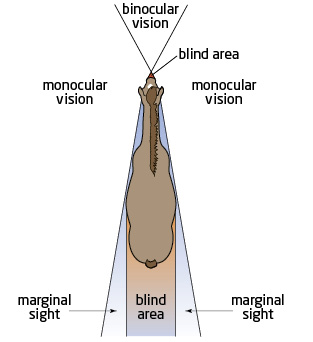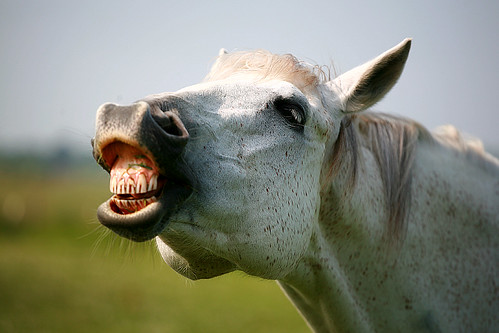Horses have extraordinary field of vision, being able to see nearly all around iptheir bodies. However they cannot see directly below their noses, due to their eyes being on the sides of their heads. They will turn their head to bring objects into focus that are out of their peripheral vision. Horses sees a well in the dark, but introducing a light source at night will impair their vision. Horse's eyesight also worsen with age.

FIELD OF VISION
A horse can see nearly all around it's body. The horse can see well in front of itself in the binocular angle of sight and the excellent vision is at the diameter of the 65 degree mark of the binocular vision. This is the reason why the opening of the blinker is restricted to this angle.
The two blind spots are right below it's nose and directly behind it.
HEARING
A horse's hearing is it most acute sense. It is able to hear many high frequency sounds that human cannot hear and can pick up sounds from several kilometers away. Because of their acute hearing, loud noises or cacophony of sounds will cause many horses distress. A horse can be voice trained to recognize words and sounds and will follow voice commands. It is also attuned to its handler's tone of voice.
TASTE
A horse's sense of taste develops depending upon how he is kept. For example, racehorses are rarely fed treats, so that it will not automatically know apples, mints, sugar and even carrots are good to eat. Despite this, a horse has a discerning palate. It can tell dry, steamy hay from hay full of flowers. It can even differentiate local and foreign water. Thus it may go off it feed or refuse water if it find the taste too foreign.
SMELL
Smell is also very important to a horse's survival. A horse relies on its sense of smell to help decipher whether someone approaching is friend or foe. It can even smell water from a great distance and will be able to find it's way back home by following scent.
 FLEHMEN RESPONSE: A horse often makes this facial expression as a reaction to unusual smells or tastes in the environment.
FLEHMEN RESPONSE: A horse often makes this facial expression as a reaction to unusual smells or tastes in the environment.TOUCH
A horse is a thin skinned, short haired mammal, so he is very sensitive to touch, and a horse can feel a fly land on it's coat as well as flick it away at the same time with a deft swing of the tail. And using it's lips and whiskers, it will pull up grasses according to feel, not sight. A highly trained dressage horse can interpret the subtle weight shifts and leg aids of its rider.
No comments:
Post a Comment